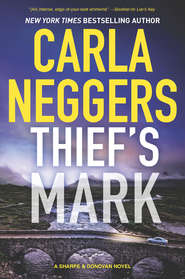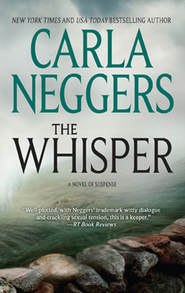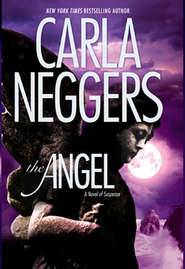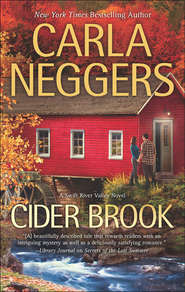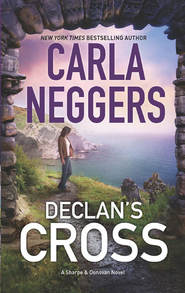По всем вопросам обращайтесь на: info@litportal.ru
(©) 2003-2025.
✖
Heron's Cove
Автор
Год написания книги
2019
Настройки чтения
Размер шрифта
Высота строк
Поля
“It sounds as if you bailed in the nick of time.”
“You mean before they fed me to the alligators?”
She gave him a faint smile. “Your sense of humor is a coping mechanism.”
He leaned in close to her. “What’s funny about alligators?”
“Do they believe they could force you to get them weapons?”
“Hard to say. They want to be arms merchants. They have contacts, resources, funds—seed money, Horner calls it.”
“Will their buyer be mad at them for not coming through with weapons?”
“Oh, yes. Very mad.” Colin realized suddenly how much he appreciated her approach to a problem. “I made it easy for Horner by turning up with orphaned weapons that I wanted to unload.”
“They knew you didn’t want a career as an arms merchant,” she said. “Just a profit. Everyone has good reason to be mad at you. Horner, the Russians, their buyer. Are they the type to exact revenge?”
Her skin was warm, as soft as anything Colin had touched in a month. “They’d have to find me first,” he said.
“And they don’t know who you are.”
“That’s right, they don’t—unless your source tipped them off.”
“My source isn’t one of them. I can tell you that much.”
“Did you break rules to find me, Emma?”
She let her fingertips drift over his chest. “I would have.” She looked up at him, her eyes as green as he’d ever seen them. “But I didn’t need to.”
“Why not?”
“You’re good at undercover work.”
It wasn’t an answer. Colin saw that she knew it, too, but he didn’t care. Not right now. He kissed her, then let the curve of his hand drift over her smooth, cool skin. “I’m good at this, too.”
6
LUCAS SHARPE SLOWED from a run to a light jog as he entered St. Stephen’s Green, a welcome oasis in the heart of Dublin. The lush greenery, flowers, statues and fountains were dripping as much as he was, if only from the early-morning rain and not a mixture of rain and sweat. He had pushed himself hard on his five-mile run. Nothing like an enigmatic, irritating email from his one-and-only sister to propel him into the Irish rain in sweats and running shoes:
I need everything you and Granddad have on London jewelry designer Tatiana Pavlova and her interest in the Rusakov collection. I’ll call tomorrow.
Btw, Colin is back.
Hope you’re enjoying Dublin,
Emma
She had sent the email at 8:00 p.m. Maine time, 1:00 a.m. in Ireland. Lucas had picked it up when he had awakened at seven in the spare bedroom of his grandfather’s Dublin apartment. Checking messages first thing, before he even crawled out of bed, was a habit he was trying, with limited success, to break. Given the five-hour time difference, there was even less point to diving onto his iPhone at first light in Ireland than in Maine, where at least he could rationalize that he wanted to stay abreast of what was going on in Europe.
As it was, by the time he read Emma’s email, it was the middle of the night on the U.S. East Coast. He would have to wait several hours before he could call his sister for more information.
Was Emma referring to Russian tycoon Dmitri Rusakov?
“Bloody likely,” Lucas muttered, jogging past a curving ornamental pond, ducks grooming themselves in the rain-soaked grass.
He slowed to a walk on a meandering path that led to a gate on the east end of the iconic green. The rain had let up but he was already soaked to the bone. Dublin was quiet so early on a drizzly Sunday morning. He crossed the normally busy street and continued into the heart of residential Georgian Dublin where his grandfather had lived for the past fifteen years.
Three days ago, Lucas had seized on the disruption of the renovations at the Sharpe house in Heron’s Cove as an excuse to fly to Dublin. He had barely had time to adjust to Irish time and get over jet lag before he had received Emma’s urgent message.
Having a sister who was an FBI agent had its drawbacks, but Lucas didn’t doubt that she was as concerned about their grandfather as he was. Ostensibly Lucas was in Dublin to check out the status of the Sharpe Fine Art Recovery office there, but he was also checking out the status of his grandfather. His health, his well-being, his plans for the future.
Easier said than done with an independent-minded old codger like Wendell Sharpe, Lucas thought with a sigh of exasperation.
He came to the narrow brick town house where his grandfather had an apartment. Born in Dublin, Wendell Sharpe had been just two when he had left Ireland with his parents for Boston. They soon moved to southern Maine, where his father had worked as a property manager and his mother as a domestic at large summer homes. Wendell had started out as a security guard at a Portland museum, ultimately finding his calling in investigating and recovering missing fine art and antiques.
His decision to open a Dublin office and return to Ireland had been a surprise, but it had also worked out well. At first, his only son—Lucas’s father—had run the Heron’s Cove office. Then a fall on the ice landed Timothy Sharpe in chronic pain, and bit by bit Lucas took over.
Now in his early eighties, Wendell, a widower for almost two decades, was giving up day-to-day work in the business to which he had devoted his life and edging into retirement, or at least semi-retirement.
Lucas went around back and ducked through a gate onto the terrace and into the kitchen. It was past eight but still no sign that his grandfather had yet rolled out of bed. Lucas was dying for coffee but returned to the small guest room and stripped off his wet clothes, leaving them in a heap on the tile floor. He pulled on a robe and headed for the apartment’s only bathroom.
A hot shower, shave and dry clothes didn’t ease his tension.
He headed back to the kitchen, filled the electric kettle with tap water and plugged it in. He dumped loose-leaf Irish Breakfast tea into an earthenware pot for his grandfather and fresh-ground beans into a glass coffee press for himself. By the time he had tea and coffee steeping, his host entered the kitchen dressed in dark gray wool trousers, a crisp white shirt, black vest and red bowtie.
“It’s Sunday, Granddad,” Lucas said.
“I thought I might go to church. Don’t worry. The rafters won’t cave in. I’ve been going more frequently in recent months.”
Lucas was worried, although not about his grandfather’s churchgoing habits. “I just don’t want you to be depressed,” he said, loading the tea, coffee, plates, silverware and a basket of toast onto a tray.
His grandfather looked mystified. “Depressed? Why would I be depressed?”
“Sometimes there’s not a reason. It just happens. Come on. The rain’s stopped. Let’s have breakfast outside.”
Lucas carried the tray and Wendell grabbed a towel to dry off the chairs and two-person round table on the small brick terrace. The sun broke through the clouds as they sat across from each other. They were both lanky and blue-eyed, but any resemblance ended there. Except for her green eyes, Emma favored their grandfather more than Lucas did.
He watched his grandfather butter a piece of toast with a steady hand. For all his expertise in fine art, Wendell Sharpe lived simply. The only art he owned was by contemporary artists and craftspeople, mostly Irish, whose work appealed to him for whatever reason. He didn’t care about critics, reviews, whether a particular work or particular artist would ever end up in a museum or prized by discerning collectors. He just bought and bartered for what he liked. His lack of snobbery, combined with his knowledge, experience and extensive contacts, made him a formidable, insightful expert in art theft and recovery. He could see, think and feel what others couldn’t or overlooked because of their blind spots and prejudices.
Lucas wanted to follow in his grandfather’s footsteps, but he knew, too, that he had to carve out his own path. And he was just thirty-four. Wendell did have a few decades on his only grandson.
Wendell took a bite of toast and poured tea. “What’s on your mind, Lucas?”
“Do you know a London jeweler named Tatiana Pavlova?”
“No, I don’t, but that’s a Russian name. Why? Who is she?”
“I don’t know. Emma sent an email last night asking about her. She said she’d call today.” Lucas poured his coffee, appreciated its heat. “She also wants anything we have on the Rusakov collection.”






